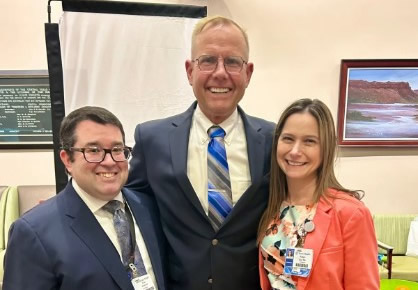FORT WORTH, Texas — Charles “Chas” Morse initially tried to donate a kidney to someone he knew who was in need.

Eric Siskind, M.D., Charles Morse and Robyn Dye, R.N.
Though Morse was quickly ruled out as a match, the Trophy Club man, who lost his wife to cancer two years ago, wasn’t deterred. He told Robyn Dye, M.S.N., M.B.A., R.N., CCTC, NEBC, administrator of the kidney transplant program at Texas Health Harris Methodist Hospital Fort Worth, that he still wanted to proceed with the testing process to see if could donate to a stranger instead.
“I said, ‘I’m a 67-year-old guy. I’m getting older and you may not want this, but I’m offering it,” Morse recalled.
In December, Morse underwent surgery at Texas Health Fort Worth to altruistically donate a kidney, making him one of the oldest living donors in the transplant program’s history.
“Those who choose to save lives through organ donation are truly heroes,” said Joseph DeLeon, president of the hospital. “Texas Health Fort Worth has been honored to facilitate some 1,250 transplants, including 171 involving living donors such as Mr. Morse.”
Eric Siskind, M.D., a transplant surgeon with Texas Health Surgical Specialists, a part of Texas Health Physicians Group, said kidney donors must be at least 18 years of age according to national regulations, but there is no maximum age for a donor.
If a recipient and donor are a match, a difference in their age is not a deal breaker. An organ from a much older person can be transplanted into someone much younger, and vice versa, he said.
“If a person in need of a kidney has the option of a kidney from an older living donor or a younger living donor, we usually pick the younger donor,” Siskind explained. “However, a kidney from an older living donor is usually a better option than that from a younger deceased donor.”
Siskind said older living donors must meet the same qualifications as their younger counterparts.
“They must be in good health with good physical fitness, and no medical comorbidities such as cancer, diabetes or heart disease,” Siskind said.
Morse’s fitness impressed those in the kidney program. He credits the Lord and staying very active outside of work, including long-distance bike riding, serving as an elder at his church and being a grandfather of eight.
Currently, more than 90,000 people in the U.S. are awaiting a kidney donation. It’s a staggering number that Morse said factored into his decision to donate.
“Dialysis is just another name for postponing death when you think about it, and here’s an opportunity for me to give someone a quality of life … to give someone a chance to live, to breathe, to be a little bit longer on this earth, because life is short.”
Follow this link to learn more about donating a kidney.
Related News
About Texas Health Resources
Texas Health Resources is a faith-based, nonprofit health system that cares for more patients in North Texas than any other provider. With a service area that consists of 16 counties and more than 7 million people, the system is committed to providing quality, coordinated care through its Texas Health Physicians Group and 29 hospital locations under the banners of Texas Health Presbyterian, Texas Health Arlington Memorial, Texas Health Harris Methodist and Texas Health Huguley. Texas Health access points and services, ranging from acute-care hospitals and trauma centers to outpatient facilities and home health and preventive services, provide the full continuum of care for all stages of life. The system has more than 4,100 licensed hospital beds, 6,400 physicians with active staff privileges and more than 26,000 employees. For more information about Texas Health, call 1-877-THR-WELL, or visit www.TexasHealth.org.
